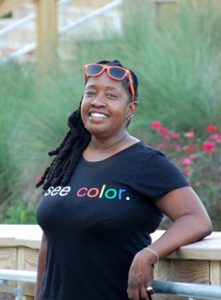Latinx Community and me
Awake, Alert and Aware:
Improving Latinx services begins with Me,
with Ivy (Mignon) Hooper, LCSW
Monday, April 16, 2018, 12-2 pm (arrive at 11:30 for light catered buffet by Vimala’s CurryBlossom Cafe)
Handouts: Glossary of Terms | printable Handouts
Description:
What does it mean to be a member of the Latinx community? This workshop encourages participants to examine cultural biases and assumptions that can contribute to treating a community of individuals as “other,” including when this stance comes from a place of ethical compassion. Ivy Hooper will draw from her extensive practice with members of the Latinx community and share powerful observations of unique strengths and challenges within its members. She will also emphasize the multiplicity of experiences within this community, diverse in: language, heritage, citizenship, nationality, ethnicity, race, residency, generation, as well as layers of individual experience. Participants will also engage in practices of self-examination and a nonjudgmental stance that applies more broadly to working with the diversity of individuals outside of the dominant paradigm.
Trainer:
 Ivy (Mignon) Hooper, LCSW is a bilingual, bi-cultural therapist with more than 20 years of counseling experience in the US and abroad. She currently sees clients at Right Direction, Inc., and Namaste Psychotherapy and Counseling, in Durham, NC, and provides supervision on culturally sensitive practices for a diverse population. Her research and practice areas include trauma and spirituality, family violence, health disparities and communities of color, and cross-cultural therapeutic interventions. She has worked as a Hospital Chaplain and an HIV/AIDS Counselor, which have increased her sensitivity around death, dying, grief and loss.
Ivy (Mignon) Hooper, LCSW is a bilingual, bi-cultural therapist with more than 20 years of counseling experience in the US and abroad. She currently sees clients at Right Direction, Inc., and Namaste Psychotherapy and Counseling, in Durham, NC, and provides supervision on culturally sensitive practices for a diverse population. Her research and practice areas include trauma and spirituality, family violence, health disparities and communities of color, and cross-cultural therapeutic interventions. She has worked as a Hospital Chaplain and an HIV/AIDS Counselor, which have increased her sensitivity around death, dying, grief and loss.
Learning objectives:
At the completion of this workshop, participants will be able to:
- Identify and categorize at least 1 personal bias that arises around engaging in therapeutic work with members of the Latinx community.
- Identify at least 3 common misperceptions about the Latinx community.
- Apply at least 1 strengths-based strategy for working more effectively with members of non-dominant groups.
References:
- Ayón, C. (2016). Talking to Latino Children About Race, Inequality, and Discrimination: Raising Families in an Anti-Immigrant Political Environment. Journal of the Society for Social Work and Research 7 (3): 449-477
- Salinas, M., Pérez-Granados, D. R., Feldman, H. M., & Huffman, L. C. (2017). Beyond immigrant status: Book-sharing in low-income mexican-american families.Journal of Early Childhood Research, 15(1), 17-33.
- Aldoney, D. & Cabrera, N.J (2016). Raising American Citizens: Socialization goals of low-income immigrant Latino mothers and fathers of young children Journal of Child and Family Studies, 25 (12): 3607–3618.
Click here for info on CE, directions, and policies for all Monday clinical lectures.